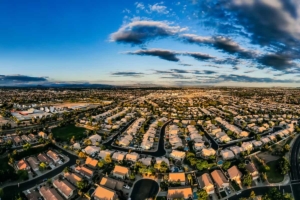Equipped with a high-tech camera that takes photos and shoots aerial footage, Unmanned Aerial Vehicles(UAV) might seem appealing to local real estate companies, but the legality of their use remains up in the air when it comes to commercial realty.
Motorized aircrafts are traditionally used for leisure activities, but UAVs are increasingly taking flight to accelerated heights. Based on Federal Aviation Administration (FAA) regulations, there are many variables to be taken into consideration when using drones for anything other than private purposes.
“The cons are pretty substantial,” says Elisabeth Martini, associate attorney at Resnick and Louis Attorneys at Law. “The biggest one being the concerns for privacy and second, the concerns about safety. Because there is a wide range of the types of drones, the safety mechanisms in them range drastically.”
The privacy of residents in close-knit neighborhoods has become a concern with the UAVs crossing property lines into another backyard. Trespassing, nuisance and spying are all examples of invasion of privacy that leave many residents concerned.
“Compared with the general public, I think the concern with drone use is more along the lines of privacy, rather than safety,” Martini says. “Generally, we’re not really worried that something is going to fall from the sky onto our property and damage it. We are thinking, ‘I don’t want somebody to be able to fly a drone over my property and see into my house.’”
Public entities, such as the government, municipalities, towns and police, can obtain a waiver from the FAA and operate UAVs for approved purposes.
“They can do border patrol sweeps, search over people’s properties for drugs or take a type of census,” says Martini. “Mainly for research, not for prosecution purposes. It is carved out for public entities rather than commercial entities.”
In 2007, the FAA reserved the right to fine, send out warning letters, issue a cease and desist order and verbally warn someone who is using a drone. Martini expresses her concerns on whether the FAA actually has the ability to fine someone for using a drone pertaining to commercial purposes.
Entering a buyer’s market, real estate has been booming, and the use of drones are a catalyst to market property at all angles. From an aerial view, buyers can get a perspective of a building’s surroundings and structure.
“It’s a great marketing tool,” says Court Rich, Senior Partner at Rose Law Group. “Showing different views of the home, land and the context of where it is. You have the opportunity of taking flattering photos or to show context, that Google Earth or walking around the house won’t get you.”
Dave Cheatham, president of Velocity Retail Group and a commercial real estate broker, incorporates the use of drones into his practice by having two drone pilots maneuver the UAVs over commercial properties. Videographers turn the aerial footage into useable marketing for the properties.
“[A drone] gives you context you cannot get from being on the ground,” he says. “You can use photography to get an oblique, angled view, to understand things such as, ingress and egress. You can see access to roads, freeways, and where the residential is. That is a real advantage. The video portion of it, gives you a virtual tour from the air.”
The cutting-edge technology has evolved at a rapid pace that the FAA is striving to develop standards and regulations for quickly. Real estate is booming and so is the use of the advanced UAVs. The National Association of Realtors has advised drones to not be used because the law is in flux, according to Martini.
Recently, Congress instructed the FAA in The Modernization of Reform Act 2012, which exempts model aircrafts, to develop a safety plan and standards in accordance with the national airspace system, according to Martini.
“The FAA has a lot of work to do in the coming months to make sure they are ready to issue these deregulations by the end of the year. There will probably be some growing pains once those come out and people try to figure out what it means to them and how to safely operate the drones for commercial purposes,” Martini said.




